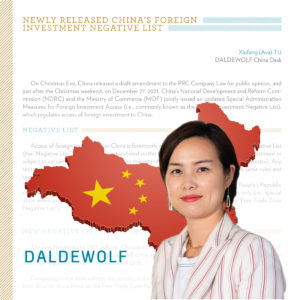On Christmas Eve, China released a draft amendment to the PRC Company Law for public opinion, and just after the Christmas weekend, on December 27, 2021, China’s National Development and Reform Commission (NDRC) and the Ministry of Commerce (MOF) jointly issued an updated Special Administration Measures for Foreign Investment Access (i.e., commonly known as the Foreign Investment Negative List), which regulates access of foreign investment to China.

NEGATIVE LIST
Access of foreign investments to China is foremostly regulated by the Foreign Investment Negative List (the “Negative List”). The industry sectors listed on this list are either prohibited from foreign investment or subject to certain limitations (for instance, no majority shareholding may be held by a foreign investor). Any sector that is not listed in the Negative List may be accessed by foreign investors under the same rules and regulations as those applicable to Chinese domestic investors.
There are in fact two negative lists in force: one applicable to all geographical areas of People’s Republic of China (the “National Negative List”), the other one applicable to the Free Trade Zones only (i.e., special areas where preferential policies and regulations on foreign investments are granted)( the “Free Trade Zone Negative List”).
NEW NEGATIVE LIST ENTERED INTO FORCE on 01/01/2022
The new Negative List (2021 edition, Chinese announcement see 国家发展改革委 商务部发布2021年版外资准入负面清单 (mofcom.gov.cn) ) came into force on 1 January 2022. This is the fourth version after the Negative List was first published in 2018.
Comparing to the 2020 edition, the sectors on the National Negative list have been continuously reduced from 33 to 31, those listed on the Free Trade Zone Negative List have been reduced to 27 sectors.
The main significant changes are as follows:
1. Total liberation of entrance of foreign investors into the automotive manufacturing sector
In both the National Negative List and the Free Trade Zone Negative List, foreign investors are not subject to the maximum 50%-shareholding restriction in the commercial vehicle manufacturing sector in China.
There is also no more limitation on how many joint ventures one foreign investor may enter into in this sector.
This represents that from now on, there is no more limitation on entrance of foreign investors in the automotive sector in China. European car manufacturers are no longer legally required to have a Chinese joint venture partner to enter this sector.
2. Further open up of the commercial service sector
In the Free Trade Zone Negative List, foreign investment access restrictions to the market research field have been removed.
However, in respect of social research, foreign investment in this sector is allowed but it still requires Chinese shareholding of not less than 67%, and the legal representative should have Chinese nationality.
3. Overseas IPO of companies in prohibited sectors must obtain pre-approval
The explanatory note to the Negative List also clearly states that any Chinese companies involved in sectors that are not open to foreign investment must beforehand obtain Government approval whenever they want to list all or part of their shares on a stock exchange outside P. R. China. Moreover, foreign investors may not participate in the management of these companies.
For more information on China’s new Foreign Investment Negative list, please contact Xiufang (Ava) TU